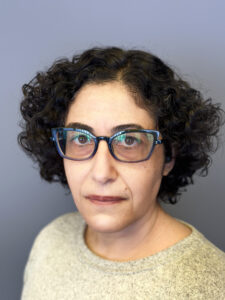Rachel Watters & Fleur Sussman
Rachel Watters

HIV Clinical Pharmacist at DCHC and the MAT Program
Hepatitis C Clinical Pharmacist for the DTES network
Fleur Sussman

HIV Clinical Pharmacist at DCHC and the MAT Program
Profile submitted by: Michelle Gnyra
Brief description of role or responsibilities
Rachel and Fleur are HIV clinical pharmacists at Downtown Community Health Clinic (DCHC) and the MAT (Maximally Assisted Therapy) program, based there, which is a multidisciplinary program that aims to improve access and adherence to antiretrovirals by people living with HIV (PLWH) in Vancouver’s Downtown Eastside (DTES).
Barriers to antiretroviral therapy faced by MAT/DCHC clients may include substance use or addiction, mental illness, limited mobility, unstable housing, trauma, financial barriers, racism within the healthcare system, and poor access to medical care.
The MAT clinical pharmacists act as consultants for DCHC clients, physicians, and nurses, work closely with the clinic’s pharmacy to organize medication provision, and assess medication safety and efficacy by providing patient medication counselling and follow up (including side effect and drug interaction review) and reviewing clinical blood work.
They also act as a liaison with hospitals, recovery and treatment programs, and other pharmacies to ensure seamless care. Rachel also has a role as the Hepatitis C clinical pharmacist for the DTES network, where she assists with hepatitis C eradication therapy initiation and monitoring, and helps ensure seamless hepatitis C treatment for DCHC, Pender, and Heatley clinic clients.
Describe how the individual or team made a positive contribution to patient care or their pharmacy department:
As the clinical pharmacist working on St. Paul’s Hospital Urban Health ward, I have the pleasure of working with Rachel and Fleur when MAT/DCHC clients are admitted to hospital under the Urban Health service. I cannot overstate what a fantastic resource Rachel and Fleur are for clinical pharmacists working in hospital, and what caring support they provide to their clients.
Rachel and Fleur are proficient in navigating the many barriers to care faced by their clients, as well as the challenges on transition to and from the hospital setting. Medication errors happen commonly at transitions of care, such as admission to or discharge from hospital. In addition, there are multiple logistical considerations for the distribution of HIV (which are centrally distributed from the BC Centre for Excellence in HIV) and hepatitis C therapies (which are very costly and only available from select community pharmacies). Hospital admission also may be an opportunity to address multiple medical concerns for clients who are poorly connected to medical care in the outpatient setting.
Rachel and Fleur provide excellent recommendations to clinical pharmacists to ensure seamless care for their clients on discharge. For example, they may help to select an appropriate community pharmacy that will be able to provide daily delivery of medications to their housing. As part of her role as the Hepatitis C clinical pharmacist for the DTES network, Rachel also helps ensure continuity of care for clients taking costly hepatitis C medications, which are not available in hospital. This may include ensuring the clinical pharmacist knows how to arrange delivery of the medications to or from hospital, or dealing with the unfortunate event of lost hepatitis C medications. As hepatitis C medications are very costly, BC PharmaCare only provides coverage for a limited course of medications, and will not typically pay to replace lost medications. In such cases, Rachel works hard to ensure uninterrupted treatment for her clients by requesting compassionate supply of medications from the drug manufacturers.
For various reasons, individuals facing barriers to healthcare as listed above may have difficulty remaining in hospital for an entire planned treatment course. In the unfortunate event of unplanned, patient-directed discharges from hospital, Rachel and Fleur work closely with me to problem-solve and optimize care for DCHC/MAT clients as much as possible. They often are able to provide insights as to how to best contact a patient to organize discharge medications (for example, through their housing/shelter, through a community pharmacy, or via outreach), and act as a liaison for communicating medication plans to the outpatient team.
Rachel and Fleur also provide inpatient pharmacists with clinical recommendations and liaise with clinical pharmacists to communicate the outpatient team’s plans. As an example, they have sometimes recommended antiretroviral regimen changes to reduce the risk of toxicities or treatment failure, provided guidance as to vaccines or monitoring blood work that are due for their clients, or recommended treatment or work-up of medical concerns that have been difficult to address in the outpatient setting. As an inpatient clinical pharmacist, I am always happy to receive a page or an e-mail from the DCHC clinical pharmacists, as I know they will have important information and valuable recommendations to provide.
Rachel and Fleur have found clever ways to communicate with their clients who are more difficult to reach in the outpatient setting, and sometimes will use the opportunity of a hospital admission to have phone consultations with their clients. To provide a recent example, Rachel went above and beyond to provide medication counselling and reassurance over the phone to a client who was anxious to be admitted to hospital or try new medications, due in part to a history of prior serious adverse events with medications. Rachel’s patient and compassionate care helped make this client much more comfortable during their hospital admission, which allowed them to access all the care they needed.
Thank you, Rachel and Fleur, for the invaluable service you provide to your clientele!
CSHPBC LetsTalkPharmacy PAM2023 PatientCenteredCare PharmacyAppreciationMonth PharmacyKudosCorner